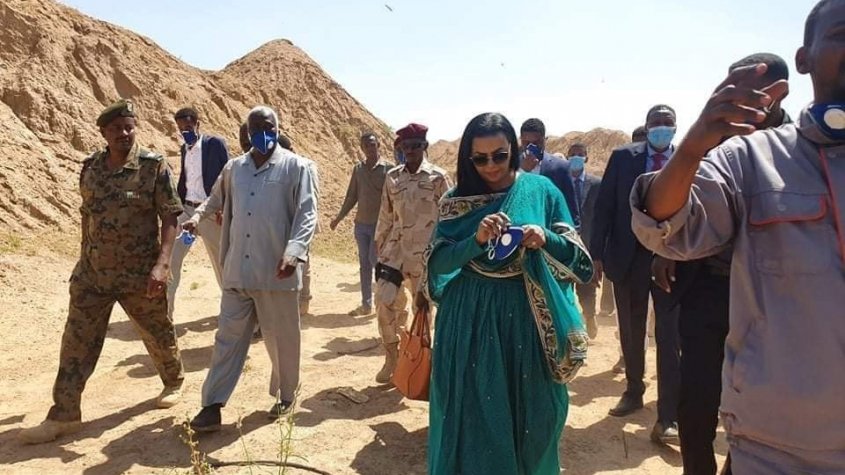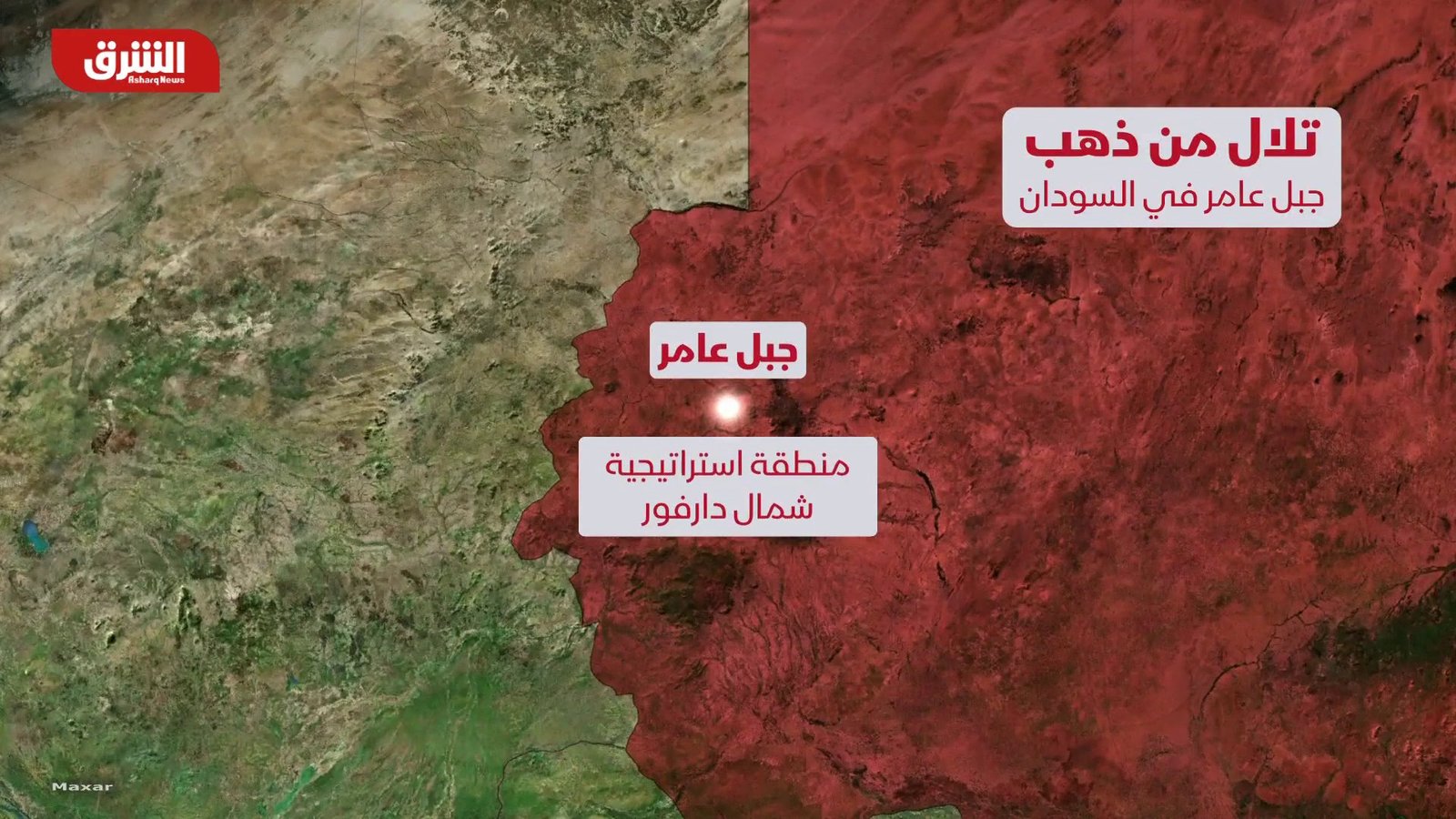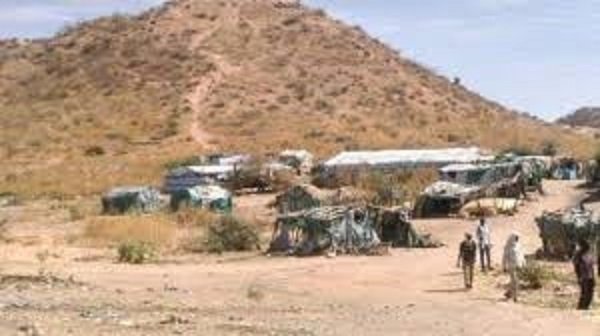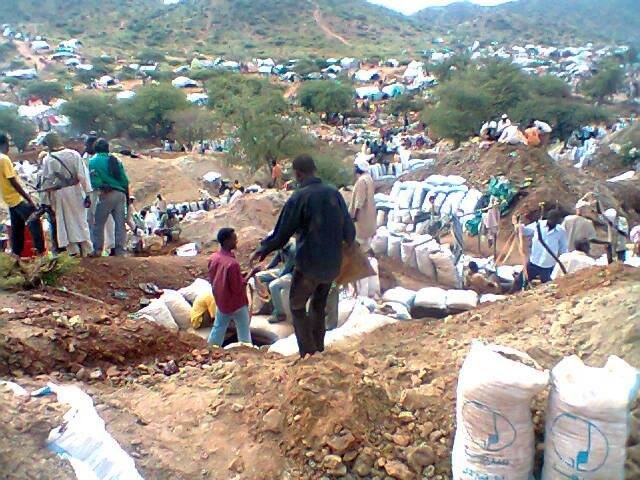Sudanhorizon Discloses Details of the Mysterious Deal: RSF Sold the Mirage of Jabal Amer to Hamdok’s Government.

Sudanhorizon news site has obtained new information that reveals many details previously unknown to the public regarding the deal made by Dr Abdalla Hamdok’s government, represented by the Ministry of Finance, with Al-Junaid Company, which is affiliated with the Rapid Support Forces (RSF). Through investigation, it has become clear that much ambiguity and manipulation surrounded the deal and that the RSF, after exhausting its purposes from Jabal Amer, sought to seize the largest share of “Sudamin,” the government arm of the Ministry of Minerals, and also aimed to become a partner in gold and copper exploration activities in the Hofrat Al-Nahas area.
It is important to note that “Sudanhorizon” contacted Mubarak Ardol, the former General Director of the Sudanese Mineral Resources Company, several times, but he ignored the requests for information regarding the deal. Here are the details of the investigation.
Sudanhorizon – Hiba Abdel Azim
“When they had money, weapons, and power after 2019, they could, along with others, swallow up all of Sudan’s resources,” said Dr Youssef Mohamed Ahmed, a geological expert and former director of the Sudanese Mineral Resources Company during Hamdok’s government, describing the RSF leaders’ attempts to control Sudan’s resources.
Youssef reveals that all easily minable gold in the Jabal Amer area was extracted between 2012 and 2019. He told “Sudanhorizon”: “What remains of gold might be deep underground, and there is a possibility that its extraction is not economically viable. One could say that the area is no longer economically viable for Al-Junaid Company, which is why they reached a completely corrupt agreement with the Ministry of Finance.” He added, “I am not sure about the role of the Ministry of Energy and Mining or the General Authority for Geological Research at that time, but I believe they played a role in the deal.”
In October 2020, the former Minister of Finance and Economic Planning, Dr. Hiba Mohamed Ali, announced that the government had taken control of the Jabal Amer area from Al-Junaid Company, following the latter’s relinquishment of the N15 block in Jabal Amer to the Sudanese government in March of the same year. At the time, the Minister of Finance stated that the agreement resulted from close cooperation between the Ministries of Finance, Energy, and Mining and a constructive partnership with Al-Junaid Company for multiple activities. She described the agreement as an important step in boosting state revenues and fostering regional and local growth, calling it an achievement for the transitional government.
At the time, some media platforms aligned with Hamdok’s government celebrated the event, describing it as a sweeping political victory, claiming the state did not lose “a single penny.” According to them, this was significant since the Sudanese public had been concerned about the Rapid Support Forces’ ownership of gold-rich mines in Darfur.

The former Director General of the Sudanese Mineral Resources Company, Dr. Yusuf, could not hide his anger regarding what he described as corruption within the Ministry of Finance, including Minister Hiba. He accused the ministry of manipulating and concealing details of the deal with Al-Junaid Company, emphasising that it was not a voluntary relinquishment of Jabal Amer as was promoted. Instead, Al-Junaid demanded compensation, which was not mentioned in Sudan’s Mineral Wealth Law. Yusuf explained: “A company that signs a mining agreement with the government in a specific area and decides to withdraw or terminate the agreement should simply submit a letter explaining the reasons—such as the area becoming economically unviable for mining—and withdraw, with the block or license area reverting to the government without the government paying a single dollar.”
He further added, “But due to corruption, including from within the Ministry of Finance and involving Minister Hiba, they reached an agreement with Al-Junaid to relinquish the block for about 50 million dollars.” More than three sources closely involved in the deal told the investigator that the government did not have the amount in hard currency to pay for the N15 block, which the North Darfur State government had owned before it was handed over to the Rapid Support Forces in exchange for a partnership from which they gained nothing. These sources revealed that the actual amount was not 50 million dollars, as rumoured, but 250 million dollars. At the time, the Ministry of Finance forced the Social Security Fund to purchase dollars from the parallel market to cover the payment, contributing to the dollar’s rise against the Sudanese pound.
Additionally, 70% of the shares in the government-owned company, Sudamin, were transferred to Al-Junaid, along with government participation in the copper-rich Songo area (located at the far western end of South Darfur near the border triangle of Sudan, South Sudan, and the Central African Republic). This occurred while the Sudanese government had financial claims of about 450 million dollars against the Rapid Support Forces, representing unpaid mining lease debts while controlling Jabal Amer. According to multiple sources, the Rapid Support Forces also obtained two letters exempting Al-Junaid from paying export revenues and royalties from the Sudanese Mineral Resources Company and the Ministry of Finance under the Omar al-Bashir government.
The (Mouhaqiq) news site obtained information confirming that security agencies, in cooperation with some professional committees, blocked the transfer of 70% of Sudamin’s shares to Al-Junaid, a company registered to Hemetti’s half-brother, Abdel Rahim Dagalo, the second-in-command of the Rapid Support Forces. During Al-Junaid’s control of Jabal Amer, the company failed to pay any export proceeds to the government, and no revenues from the gold produced from the area ever entered the state treasury.
The Secret Deal
It is clear that the Prime Minister’s Office and the Ministry of Finance, represented by then-Minister Hiba Mohamed Ali, deliberately ignored consulting or informing the Economic Committee of the Forces of Freedom and Change (FFC) or the Energy and Mining Committee under the University of Khartoum initiative about the deal. According to Adil Khalafallah, a member of the Economic Committee of the FFC, who spoke to Sudanhorizon news site, “The Economic Committee of the FFC, of which I was a member, did not know about the agreement between the Ministry of Finance and Al-Junaid Company, affiliated with the Rapid Support Forces (RSF). This topic was never raised in any meetings between the Economic Committee of the FFC, the Ministry of Finance, or the Prime Minister, nor discussions with the ministers of the economic sector or during the general budget debates.”
He explained that the process was carried out in complete secrecy, with no communication about the procedures or correspondence related to the deal. He added, “I do not believe there are any documents in the Ministry of Finance regarding this matter.”
“All that was publicly announced was that the Ministry of Finance paid Al-Junaid 50 million U.S. dollars in exchange for relinquishing Jabal Amer, one of the richest mining areas, including gold deposits.” Just so you know, this happened after Dr. Hiba took over the Ministry of Finance from Dr. Elbadawi. Both ministers followed similar practices, as seen in the agreement for the supply of petroleum derivatives monopolised by Al-Fakher, a deal made by Dr Elbadawi, who fiercely defended the economic liberalisation policies alongside the Prime Minister. These decisions bypassed the standard governmental contracting and procurement procedures. Another controversial topic between the FFC’s Economic Committee and the economic policies pursued by the Ministry of Finance and the Prime Minister was the agreement with the International Monetary Fund (IMF), known as the SMP (Staff-Monitored Program).
Khalafallah stated, “It later became evident that Al-Fakher, like Al-Junaid, is also affiliated with the RSF.”
Kamal Karrar, a member of the Economic Committee of the Forces of Freedom and Change (FFC), confirmed to Sudanhorizon that the announcement of Al-Junaid Company’s relinquishment of Jabal Amer mining block came without details in March 2020, as reported by the official news agency. However, the details emerged in October of the same year. He said, “The entire deal is riddled with corruption. No provision in the Mineral Resources Law addresses compensation when relinquishing a mining block.”
Karrar explained that the Undersecretary of the Ministry of Energy and Mining sent a letter informing the acting minister that Al-Junaid Company had requested compensation from the ministry, amounting to around 8 tons of gold. Based on this request, the undersecretary called for an independent expert to assess the technical work carried out in the block. The undersecretary believed that accepting the principle of compensation would benefit both parties.
The Undersecretary of the Ministry of Energy and Mining at the time, Yahya Mohamed Abdel-Jalil, proposed two options in his letter to the minister. The first was establishing a partnership between the ministry and Al-Junaid Company, citing security challenges and companies’ difficulty operating safely. His second proposal suggested compensation by allocating mining blocks equivalent to the area of Al-Junaid’s block, with production returns from Jabal Amer and assets equivalent to those in Jabal Amer or shares in profitable government companies. He urged the minister to make an appropriate decision and refer the matter to the Ministry of Finance to complete the procedures.
Karrar further stated that Al-Junaid Company received financial compensation, and the block itself was transferred to Al-Fakher Company, owned by the Rapid Support Forces (RSF).

Sudanhorizon news site obtained confirmed information that some members of the committee formed to assess assets faced death threats from Abdul Rahim Dagalo, the Deputy Commander of the Rapid Support Forces (RSF). These threats targeted any government officials who objected to or protested the compensation deal in exchange for Al-Junaid Company’s relinquishment of Jabal Amer. Notably, several evaluation committee members opposed the deal due to its legal inconsistencies and were subsequently removed.
On September 3, 2020, Al-Junaid Company formally requested Minister of Finance Dr. Hiba Mohamed Ali in a letter titled “Allocation of Shares for Al-Junaid Company for Multiple Activities in Sudamin Company.” The letter stated that the Ministry of Finance had approved a sum of $200 million in favour of Al-Junaid Company for relinquishing the concession block (N15) in Jabal Amer. Part of this amount was used to purchase shares in Sudamin Company and allocate lucrative mining blocks.
On September 8, 2020, Minister of Finance Dr Hiba Mohamed Ali addressed a letter to Mubarak Ardol, the Director General of the Sudanese Mineral Resources Company, instructing that $50 million be paid to Al-Junaid Company, deducted from the royalties owed by Al-Junaid’s projects.
A committee to evaluate Sudamin Company was formed by decision No. 69, issued by the acting Minister of Finance Dr. Hiba Mohamed Ali on September 27, 2020. The committee included representatives from the Ministry of Energy and Mining, the Sudanese Mineral Resources Company, Sudamin, and members from the Ministry of Finance. In a single meeting, the committee agreed to grant Al-Junaid a 34% share in Sudamin as part of the settlement between the Sudanese government and Al-Junaid for relinquishing block N15 in Jabal Amer. However, sources revealed that crucial details were deliberately hidden.
Shocking Figures
The numbers reported by semi-official sources on Sudan’s gold production exceeding 250 tons annually caused widespread shock. Official reports confirmed that total gold production in the year before 2018 was only 93 tons, revealing a huge discrepancy of around 157 tons. This equates to approximately $6.65 billion, the estimated value of gold smuggled outside official state channels. In 2017, then Minister of Minerals Ahmed Mohamed Sadiq Al-Karuri admitted that no gold from Jabal Amer had ever reached the state treasury.
Despite the absence of official data on the production and reserves of gold in Jabal Amer, testimonies from visitors to the region suggest that there are over 300 gold mines. More significantly, the UN Sanctions Committee reported that between 2010 and 2014, around $5.4 billion worth of gold was smuggled and exported from the area. Additionally, 37.7% of Sudan’s exports in 2018 were from gold, with government figures indicating production of 93.4 tons, generating $1.156 billion in hard currency for the country. In the first half of 2019, Sudan produced approximately 280,150 kilograms of gold, valued at around $6.7 billion, according to the Central Bank of Sudan.
A Global Witness report noted that between 2012 and 2019, the Sudanese Central Bank purchased gold tied to armed groups fighting to control Darfur’s mines. This included gold bought from a company associated with the Rapid Support Forces (RSF). The report also suggested that the Emirati company Kaloti likely acquired at least 20 tons of gold linked to armed groups in Darfur, a region marked by long-term conflict and alleged genocide, according to Global Witness.

Jabal Amer: The Origin of the Story
Jabal Amer is named after one of the sons of the Mahamid tribe, who used to herd his cattle and, during the summer, would settle in the valley of the mountain. The local people surrounded this area with several legends, describing it as extraordinary due to the sparkle it emits during sunrise and sunset.
In April 2012, a small team of wandering miners discovered gold in the hills of Jabal Amer. One of the mines was extremely rich, bringing millions of dollars to its owners and earning it the nickname “Switzerland,” according to a report by the International Crisis Group. The report highlighted that miners flocked to Jabal Amer from all over Sudan, the Central African Republic, Chad, Niger, and Nigeria following a visit by Sudan’s then-Minister of Mining Kamel Abdel Latif and the Governor of North Darfur, Osman Mohamed Yusuf Kibir.
The discovery of gold in Jabal Amer resulted from the search for an alternative to oil after South Sudan’s secession in 2011. Over 60,000 miners are currently prospecting for gold in Jabal Amer. The Geological Research Authority announced the mapping of 1,800 square kilometres of the concession area, along with geological sampling and sediment studies.
The mountain is 100 kilometres north of El Fasher, the capital of North Darfur State in western Sudan, and 70 kilometres from the nearest populated town.

The Road to the Gold Mountain
Gaining information from inside the mountain has not been easy, with tales of extreme danger and the possibility of murder or kidnapping before reaching this gold mountain. Local residents who worked in the area during the time when the Al-Junaid Company controlled some mines describe the mountain as a plateau and highlands interspersed with an enormous number of mining wells, exceeding 7,000. Security around the controlled areas was heightened, with an estimated 3,300 Rapid Support Forces (Janjaweed) soldiers providing guard, alongside armed “Tatchets” and rocket launchers patrolling the area, and more than ten tanks and Apache helicopters.
At first glance, the area appears like a massive market in a narrow, winding passage. Primitive shops selling hardware and clothing line both sides of the passage, and in the middle, glass-fronted shops are run by gold traders and jewellers who purchase gold from traditional miners in the mountain. One trader revealed that they used to buy over 35 kilograms of gold daily, with transactions often conducted in cash despite the high values, sometimes purchasing between 3 to 7 kilograms from a single person. The amount spent could exceed three and a half billion Sudanese pounds for three kilograms in 2018, indicating the high volume of cash flow in Jabal Amer.
Shortlink: https://sudanhorizon.com/?p=1516

